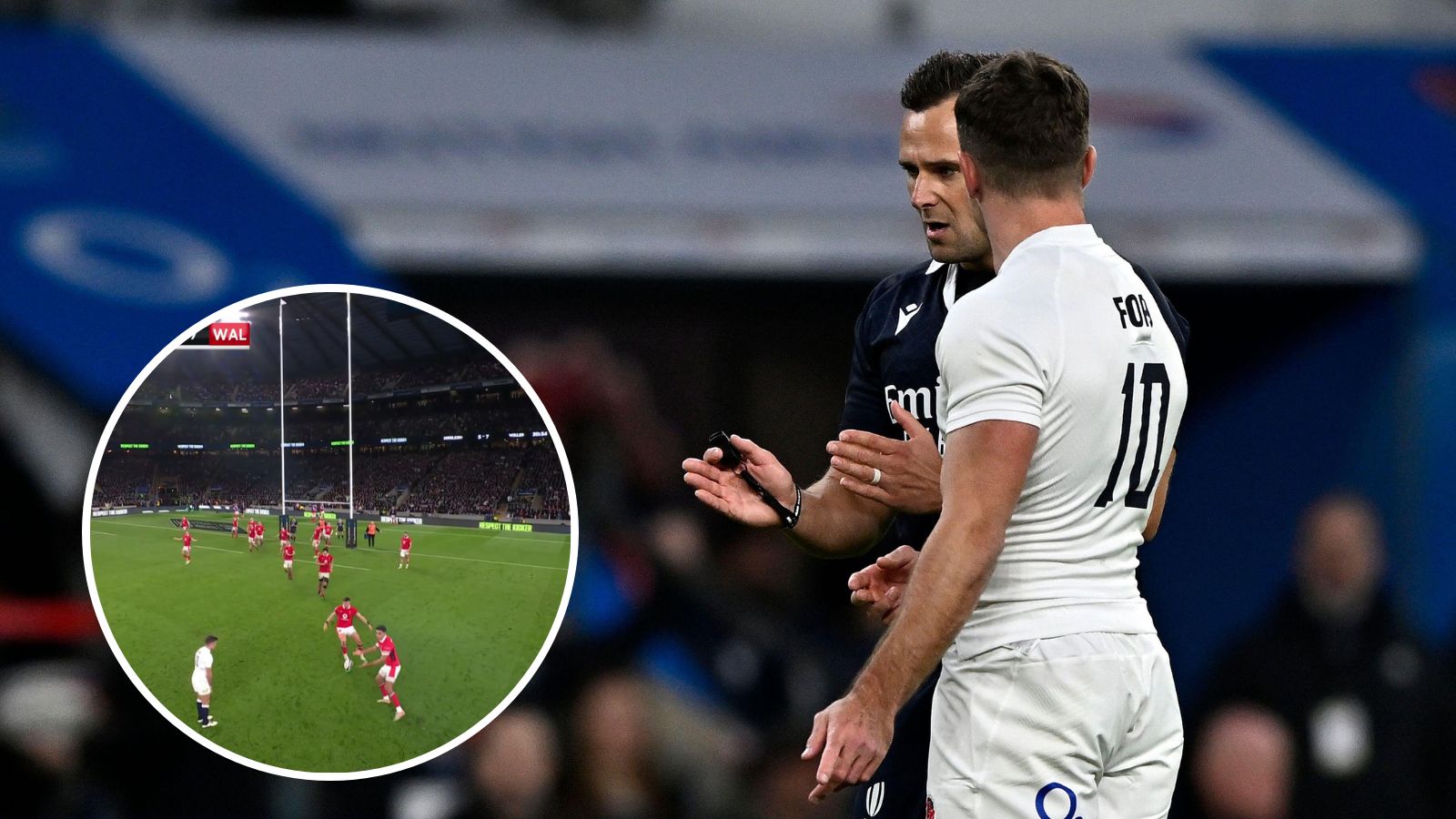
WAS GEORGE FORD’S DENIED CONVERSION DURING ENGLAND V WALES THE CORRECT CALL?
England fly-half George Ford was left baffled after Wales successfully denied him a conversion during the Six Nations match at Twickenham on Saturday.
After going down 7-0 in the early knockings of the match, Ford had the opportunity to level the scores with a fairly straightforward conversion after Ben Earl’s 19th-minute try.
However, the England playmaker was unable to convert the easy kick, by his lofty standards, when Wales wing Rio Dyer ran out and booted the ball off his tee.
The experienced fly-half turned to referee James Doleman and pleaded to the official as he expected the New Zealander to allow him a chance to retake his conversion attempt but was denied.
The official explained that Ford had begun his approach to the ball, which allowed the Welsh wing to sprint up and attempt a charge down.
Ford baffled
Ford was not the only one who was left bemused and puzzled by the call with ITV’s pundits discussing the decision and even referenced an outdated law to explain Doleman’s call.
Even after the game, Ford was still baffled by the call.
“It’s the first time that it’s happened. I was obviously at the back of my stance, and I fidgeted a little bit, nudged to the side a little bit, and that’s then been taken, that I have initiated my run-up,” the England vice-captain said after the match.
“Look you get on with it and we will make sure as kickers that we’re diligent with that, if that’s the route that the referees are gonna go down and make sure it doesn’t happen again.”
Asked if he felt the decision was ‘harsh’, Ford replied: “Yeah, first time I’ve ever seen it in my rugby career.”
Former Wales fly-half Dan Biggar believed that the correct decision was reached.
“He tried to be a little bit too clever, trying to run the clock down with just 13 men on the field. He will be disappointed, but for me, he’s moving to the side in preparation to take the kick,” Biggar said on ITV.
Former England fly-half Jonny Wilkinson disagreed with Biggar and felt that Ford should have been allowed to retake the kick.
“It is very difficult for a referee to know when a kicker has started his approach, that’s for the kicker to know,” he said.
“I’d side with the kicker here and send the defence back.”
Was the decision correct?
But was the correct decision reached?
Law 8.14, concerning the opposing team at a conversion, reads: “All players retire to their goal line and do not overstep that line until the kicker moves in any direction to begin their approach to kick.
“When the kicker does this, they may charge or jump to prevent a goal but must not be physically supported by other players in these actions.”
The above mentions that the opposition must not advance from their goal line until the “kicker moves in any direction to begin their approach”.
2020 clarification
However, in 2020, World Rugby provided further clarification after a request from New Zealand Rugby following a similar incident during the 2020 Super Rugby Aotearoa competition.
Crusaders back Braydon Ennor managed to charge down Blues fly-half Otere Black’s kick. Black’s kicking routine featured a few steps backward before moving forward to strike the ball, and in this case, Ennor shot up as he moved backwards and managed to sprint up and make the block.
NZ Rugby requested clarification regarding what it means to ‘begin to approach to kick’, and the clarification read as follows: “The moment the kicker moves in any direction, it is deemed that he is ‘approaching to kick’.
“The reason for this interpretation is simplicity, otherwise the referee would have to judge when the kicker first moves, and in what direction. It would also be open to misinterpretation by players, match officials and spectators.”
In our opinion, referee Doleman’s decision is spot on, as Dyer and his teammates only advance once Ford takes one step to his left.
The England fly-half might not feel like his step sideways is part of his approach to the ball, but as the clarification indicated above, a step in any direction is deemed to be approaching to kick.
Cheslin Kolbe’s charge down
A similar incident occurred during the 2023 Rugby World Cup quarter-final between hosts France and South Africa, where Springboks wing Cheslin Kolbe was able to charge down Thomas Ramos’ conversion attempt.
Much like this situation, Kolbe knew the movements of Ramos when he took his kick, and while the Frenchman may not have stepped towards the ball, he did move, which was the trigger for Kolbe to sprint forward.
Unlike the quarter-final last year, Ford’s missed shot at goal had no influence on the match’s result as England still fought back in the second half to defeat Wales 16-14.
2024-02-11T15:05:17Z dg43tfdfdgfd